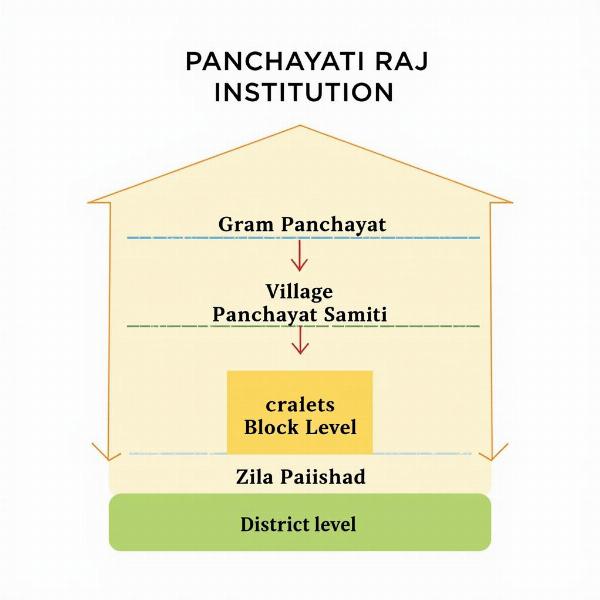Local self government, or as we say in Hindi, स्थानीय स्वशासन (sthaniya swa-shasan), is a cornerstone of democratic governance. Understanding its meaning and significance is crucial for every Indian citizen. This article delves into the core concept of local self government, exploring its various facets, functions, and importance in the Indian context.
Local self government empowers communities to manage their own affairs, fostering participatory democracy at the grassroots level. It provides a platform for citizens to actively engage in decision-making processes that directly impact their lives. From sanitation and healthcare to education and infrastructure development, local self government bodies play a vital role in shaping local development.
Understanding स्थानीय स्वशासन: A Deep Dive
The term स्थानीय स्वशासन (sthaniya swa-shasan) literally translates to “local self-rule”. It signifies the transfer of power and responsibility from the central or state government to local bodies, enabling them to administer their own areas. This decentralization of power promotes efficiency, accountability, and responsiveness to local needs.
The Structure of Local Self Government in India
India’s local self government system is structured in a tiered manner, comprising rural and urban local bodies. In rural areas, we have Panchayati Raj Institutions (PRIs), which include Gram Panchayats at the village level, Panchayat Samitis at the block level, and Zila Parishads at the district level. In urban areas, the system includes Municipal Corporations for larger cities, Municipalities for smaller towns, and Nagar Panchayats for transitional areas.
 Panchayati Raj Institutions Structure
Panchayati Raj Institutions Structure
These bodies are elected by the people and are responsible for providing essential services and implementing development programs within their respective jurisdictions. They act as a bridge between the government and the people, facilitating effective communication and ensuring that local needs are addressed promptly.
Functions of Local Self Government Bodies
Local self government bodies perform a wide range of functions, including:
- Providing basic amenities like water supply, sanitation, and street lighting.
- Maintaining roads, parks, and other public infrastructure.
- Promoting primary education and healthcare facilities.
- Implementing local development plans and schemes.
- Collecting local taxes and managing finances.
By performing these functions effectively, local self government bodies contribute significantly to improving the quality of life in their areas.
Why is Local Self Government Important?
Local self government is crucial for several reasons:
- Empowerment of People: It gives citizens a voice in local decision-making, fostering a sense of ownership and responsibility.
- Efficient Governance: Decentralization allows for quicker and more effective responses to local needs and challenges.
- Improved Accountability: Locally elected representatives are directly accountable to the people they serve.
- Development at the Grassroots: Local self government bodies are better equipped to understand and address the specific development needs of their areas.
- Strengthening Democracy: It strengthens democratic values by promoting participation and engagement at the local level.
Conclusion
Local self government, or स्थानीय स्वशासन (sthaniya swa-shasan), is an integral part of India’s democratic framework. By understanding its meaning, structure, and significance, citizens can actively participate in shaping their local communities and contributing to the overall development of the nation. The empowerment provided by local self governance paves the way for a more inclusive, responsive, and efficient governance system.
FAQ
- What is the meaning of Gram Panchayat? Gram Panchayat is the basic unit of local self government in rural India. It represents a village or a group of villages.
- What is the role of Municipal Corporations? Municipal Corporations are responsible for administering larger urban areas, providing essential services, and implementing development plans.
- How are local self government bodies funded? Local self government bodies receive funds from various sources, including local taxes, grants from the state and central governments, and loans.
- What are the benefits of decentralization? Decentralization empowers local communities, improves efficiency, and enhances accountability in governance.
- How can citizens participate in local self government? Citizens can participate by voting in local elections, attending meetings of local bodies, and voicing their concerns and suggestions.
- What is the difference between urban and rural local bodies? Urban local bodies administer cities and towns, while rural local bodies administer villages and rural areas.
- What is the significance of local self government in a democracy? Local self government strengthens democracy by promoting citizen participation and ensuring responsive governance at the grassroots level.
Meaning-Hindi.in is your trusted partner for professional Hindi translation services. We offer a wide range of translation solutions, including business and commercial document translation, legal and certified translation, technical and user manual translation, website and software localization, and academic and educational material translation. Our expert translators ensure accurate, culturally sensitive, and timely delivery of your projects. Contact us today for all your Hindi translation needs! Email: [email protected] Phone: +91 11-4502-7584. Meaning-Hindi.in offers high-quality and professional translation services, ensuring your message is effectively conveyed across languages and cultures.